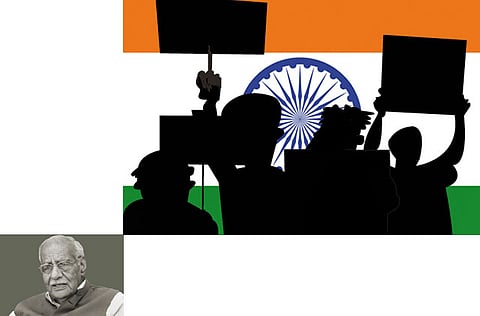Humility versus arrogance in India
Hazare is only the face of people's resentment against the government, which seems oblivious to their plight

I had tried conciliation between Prime Minister Manmohan Singh and Gandhian Anna Hazare on the Jan Lokpal bill (anti-corruption ombudsman). This was on the fifth day of Hazare's fast and his movement against corruption had brought thousands of people on streets across India.
Soon after I heard Singh saying on television networks that the government was open to a "discussion or dialogue" on the Lokpal bill placed before parliament, I saw a window of opportunity. That very afternoon, I went to meet Hazare whom I knew a bit. I found him prepared for a compromise provided three basic conditions were substantially met.
The first condition was the independence of the judiciary. I told him to have a Lokpal exclusively for the judiciary. Hazare readily agreed to it. The second was the prime minister. Hazare was willing to divide the office in two parts, one relating to governance and the other to acts of corruption. He only wanted to pursue the instance of corruption if prima-facie a case was established as enunciated in the Lokpal bill, Hazare's version. The third condition was the independence of the Central Bureau of Investigation (CBI). Hazare agreed to place the organisation under the Supreme Court until the modified Lokpal bill was passed in parliament. I did not speak to the prime minister directly, but someone who knows him personally conveyed what Hazare had conceded. The prime minister's reply was not helpful. He said that Hazare should go before the Parliament Standing Committee which was discussing the matter. The plea that he should invite Hazare to a special sitting of all political parties was also rejected by the prime minister.
I find that what the government has agreed to after three days of my initiative is more or less the same. The prime minister and the CBI will come under the ambit of Lokpal. The judiciary will be independent of the Lokpal, under a judicial commission to be finalised in consultation with Hazare.
One thing that came out clearly from the brief exercise that I undertook was Hazare's humility and government's arrogance. And I do not know why it believes that by running him down it would be in a better position to deal with him.
As if abuses were not enough, the government and the Congress party have told the nation, no more gullible, that Hazare is being helped by a foreign hand. Will it give us any proof since the government talks about transparency day in and day out? Indira Gandhi who imposed the emergency and detained 100,000 people without trial called Gandhian Jayaprakash Narayan, the spirit of the movement at that time, a CIA agent. The Congress was defeated at the polls and a repetition is likely in the 2013 general election.
All this is probably history. But the nation should also learn a lesson. In democracy there is neither black or white, but a grey area. One cannot fix the date or insist publicly on treading a particular path. The consensus is important and there has to be give and take so that the majority and the minority are brought around to accept the compromise formula. The Congress has never liked dissent or defiance. It treats every popular movement as a law and order problem. That is the reason why it has not yet understood the rationale of any popular outburst. Hazare is only the face of people's resentment against the government. The government is still oblivious to the countrywide resentment against it. Either its intelligence agencies are deluding it or it is merely reflecting the mentality of dictators.
The Congress should have commended the awakening of the youth instead of using wrong tactics to defame the movement. The youth are confused by Aruna Roy's open criticism of Hazare's Lokpal bill. He himself realises some of its limitations. But the activists cannot afford to show division in their ranks when the government is out to crush a movement that has caught the people's imagination. I respect Roy's integrity and the tremendous work she has done to get the Right to Information act on the structure. But I felt disappointed that she had to voice her opposition at a time when the movement was facing the government's hostility. I am glad she has put before the nation a third draft of the Lokpal bill. But it too suffers from many limitations.
Singh could have probably saved the situation if he had been his own master. Today, everything around the prime minister has fallen and he is a lonely person. But he has himself to blame because he refused to make up with Hazare when the latter was willing to meet him more than half way. Singh can take the stand that he had to take along the Congress president and cabinet members. But posterity will blame him.
Kuldip Nayar is a former Indian High Commissioner to the United Kingdom and a former Rajya Sabha member.


